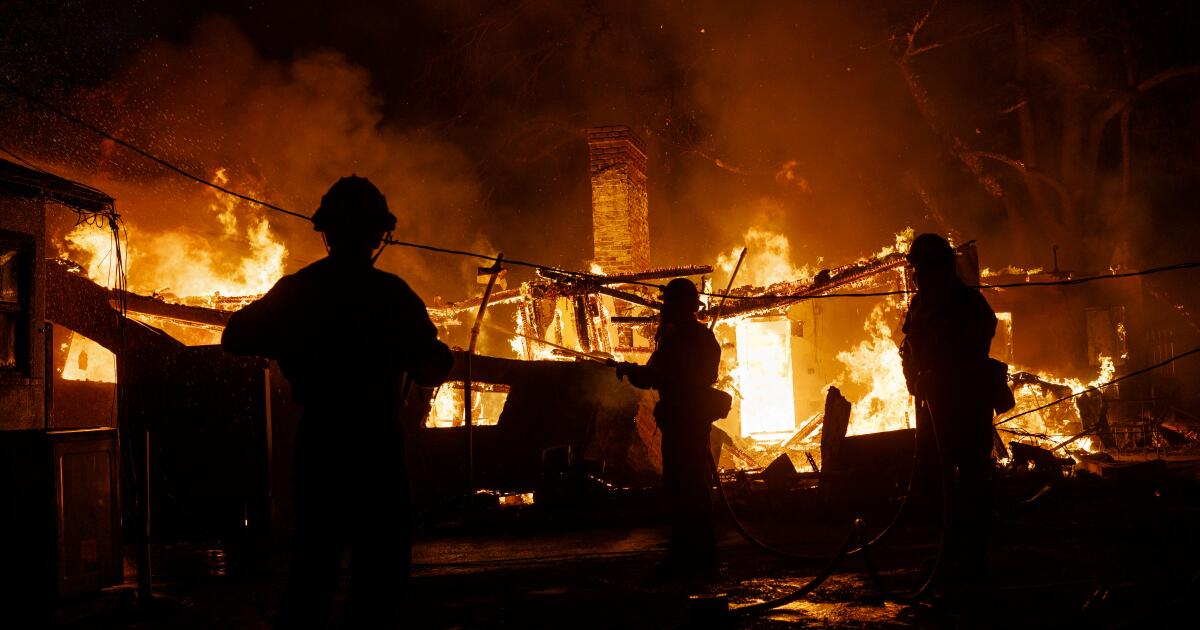Edison sues L.A. County and other agencies, saying they share blame for Eaton fire deaths, destruction
Southern California Edison sued Los Angeles County, water agencies and two companies including SoCalGas Friday, saying their mistakes contributed to the deadly and destructive toll of last year’s Eaton wildfire.
Edison now faces hundreds of lawsuits by victims of the fire, which claim its transmission line started the devastating fire that killed at least 19 people and destroyed thousands of homes in Altadena. The cost of settling those lawsuits could be many billions of dollars.
Doug Dixon, an attorney who represents Edison in the fire litigation, told the Times that Edison filed the lawsuits “to ensure that all those who bear responsibility are at the table in this legal process.”
The utility’s two legal filings in L.A. County Superior Court paint a picture of sweeping mismanagement of the emergency response on the night of the fire.
Edison blames the county fire department, sheriff’s department and office of emergency management for their failure to warn Altadena residents west of Lake Avenue to evacuate.
The Times revealed last January that west Altadena never received evacuation warnings, and orders to evacuate came hours after flames and smoke threatened the community. All but one of the 19 who died in the Eaton fire were found in west Altadena.
Edison also sued L.A. County for failing to send fire trucks to the community. A Times investigation found that during a critical moment in the fire, only one county fire truck was west of Lake Avenue.
The electric company also filed suit against six water agencies, including Pasadena Water & Power, claiming there were insufficient water supplies available for firefighters.
“Compounding the unfolding disaster, the water systems servicing the areas impacted by the Eaton Fire failed as the fire spread, leaving firefighters and residents with no water to fight the fire,” the lawsuit states.
Another lawsuit aims at SoCalGas. Edison says the company failed to turn off gas lines after the fire started, making the disaster worse.
“SoCalGas did not begin widespread shutoffs for four days—until January 11, 2025—in the area affected by the Eaton Fire,” the complaint states. “In the meantime, the Eaton Fire continued to spread fueled by natural gas.”
“ The risks and deficiencies with SoCalGas’s system that led to it spreading the fire were long known to SoCalGas, and yet it nevertheless failed to adequately account for them in designing, building, and maintaining its system,” the complaint said. “The result was catastrophic.”
Edison also sued Genasys, a company that provides the county with emergency alert software.
In addition, the utility sued the county for failing to remove brush, which it claims made the fire hotter and spread faster, causing more damage.
In March, L.A. County filed suit against Edison, claiming that its transmission line sparked the blaze, requiring the county to incur tens of millions of dollars responding to the fire and its aftermath. The county is seeking compensation for destroyed infrastructure and parks, as well as for cleanup and recovery efforts, lost taxes and overtime for county workers.
Edison’s new cross claims will be heard in the consolidated Eaton fire case in Superior Court, which is also handling the lawsuit that the county and other public agencies have filed against the electric utility.
Officials from the county and water agencies, as well as from the two companies, could not be immediately reached.
The water agencies that Edison sued also include the Sierra Madre City Water Dept., Kinneloa Irrigation District, Rubio Canyon Land & Water Association, Las Flores Water Company and Lincoln Avenue Water Company.
The government investigation into the fire, which is being handled jointly by L.A. County Fire and the California Department of Forestry and Fire Protection, has not yet been released.
Edison has said that a leading theory is that its unused, century-old transmission line in Eaton Canyon somehow became re-energized on the night of Jan. 7, 2025 and sparked the blaze.
The fire roared through Altadena, burning 14,021 acres and destroying more than 9,400 homes and other structures.
